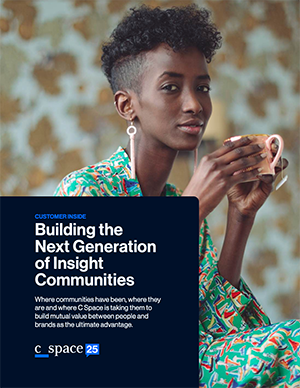This article is part of a year-long, 25th anniversary series that explores where insight communities have been, where they are today, and the market and customer trends that are shaping where C Space is taking insight communities next.

Welcome to the second in a series of articles where we unpack common marketing mistakes brands and organizations make, share advice on how to avoid them and signpost resources to help you maximize profit and build relationships with your consumers through thoughtful campaigns around cultural moments. Each article features a different cultural celebration in the US.
Today we explore Black History Month, also known as African-American History Month.
What does Black History Month mean to consumers?
In the spring of 2023, we spoke to 200+ consumers across the US to understand their feelings and attitudes towards Black History Month as well as how it is celebrated and marketed by brands.
The purpose of Black History Month is to highlight and celebrate the contributions of African-Americans to the development of the US. It is a month-long observance that coincides with other prominent festivities and federal holidays such as Valentine’s Day and Presidents’ Day. Our Cultural Advisory Group wondered: Considering the numerous observances in February, do Black History Month marketing messages resonate with and feel relevant for US consumers? It turns out, the messages do not.
In celebrating Black History Month, consumers favor first-hand accounts from the Black community. Indeed, marketing campaigns featuring lesser-known Black historical figures, Black business leaders, employees, celebrities and families and campaigns that align with the organization and brand’s story, resonate most with consumers as the right approach. They also build trust and credibility. So, for this and future Black History Months, consider passing the microphone to the relevant voices in the room and avoid messages including controversial quotes, symbols or double entendres.
Black History Month marketing messages highlighting partnerships with Black-owned businesses and lesser-known Black historical figures drive consumers’ interest in a brand.
Best-in-class brand recognition is yours for the taking
Three in 10 consumers we spoke with could not identify a single brand that excelled at celebrating Black History Month. One in 10 mentioned Target, and even fewer than one in 10 each referenced Nike, Walmart, Ulta and Apple. Of note, there were no ethnic or racial differences among consumers, indicating their impartial recognition for brands that are doing it well.
To rank as best-in-class, a brand’s celebration of Black History Month (akin to its celebration of MLK Day in the month prior), must be sincere, relatable and enduring.
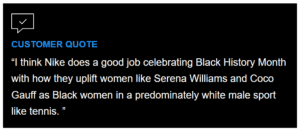
It must also include authentic representations of the Black community. Black History Month marketing messages highlighting partnerships with Black-owned businesses, celebrities, lesser-known Black historical figures and interracial families, drive consumers’ interest in a brand. Meanwhile controversial quotes, particularly those with historical negative connotations (e.g., Black boy joy), are less impactful.
You must first carefully assess your own brand
What’s your brand story?
Consumers are acutely aware of a brand’s past and present, controversial, prejudicial or discriminatory behaviors and associations, whether intentional or not. A quick scan of the internet spotlights several brands that have, over the years, undergone negative press, which continues to impact consumers’ thoughts and feelings towards brands and their marketing campaigns.
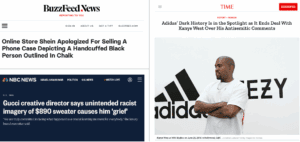
In effect, consumers question the sincerity and appropriateness of the brand’s efforts in celebrating Black History Month; and despite well-intentioned plans, consumers infer incongruencies, insincerity and tokenism
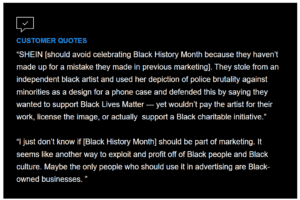
Where applicable, be transparent about owning your mistakes and develop a strategy to make amends for past wrongs and dispel concerns of tokenism.
Are you in it for the long-haul?
Long-term commitments, like Mattel’s to diversity and representation*, including the release of its Black Barbies in the 1960s, cement brand authenticity at the time of celebrating Black History Month. Likewise, marketing campaigns for brands that demonstrate tangible and long-lasting impact on the subject matter are more likely to resonate with consumers. And while Black History Month may last a season, a brand’s continuous commitment positively correlates with brand growth all year-round.

Have you invited the right people to the podium?
In celebrating Black History Month, consumers favor first-hand accounts from the Black community and partnerships resulting in tangible impact.
Black History Month marketing campaigns showcasing accomplishments and contributions of Black people, their culture, stories and views, are perceived as more authentic. It’s also important to be specific about your organization’s (or brand’s) commitment in a tangible way.
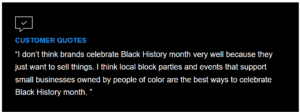
It’s time to transform your business
Best practices dictate that all corporate initiatives should bring a Belonging & Inclusion lens, so your insights are future-proof. Our Cultural Advisory Group has helped some of the world’s most well-known B2B and B2C brands with their initiatives. Let us do the same for you.
About C Space’s Cultural Advisory Group
Thank you for reading the second in a series of articles on inclusive marketing. If you missed it, you can read the first here: What Do Customers Expect from Brands on MLK Day?
Watch this space for successive chapters: deep dives into cultural celebrations and observances in the US and around the world and practical advice on how brands can participate in inclusive and authentic ways.
________________________________________________________________________________________________________


